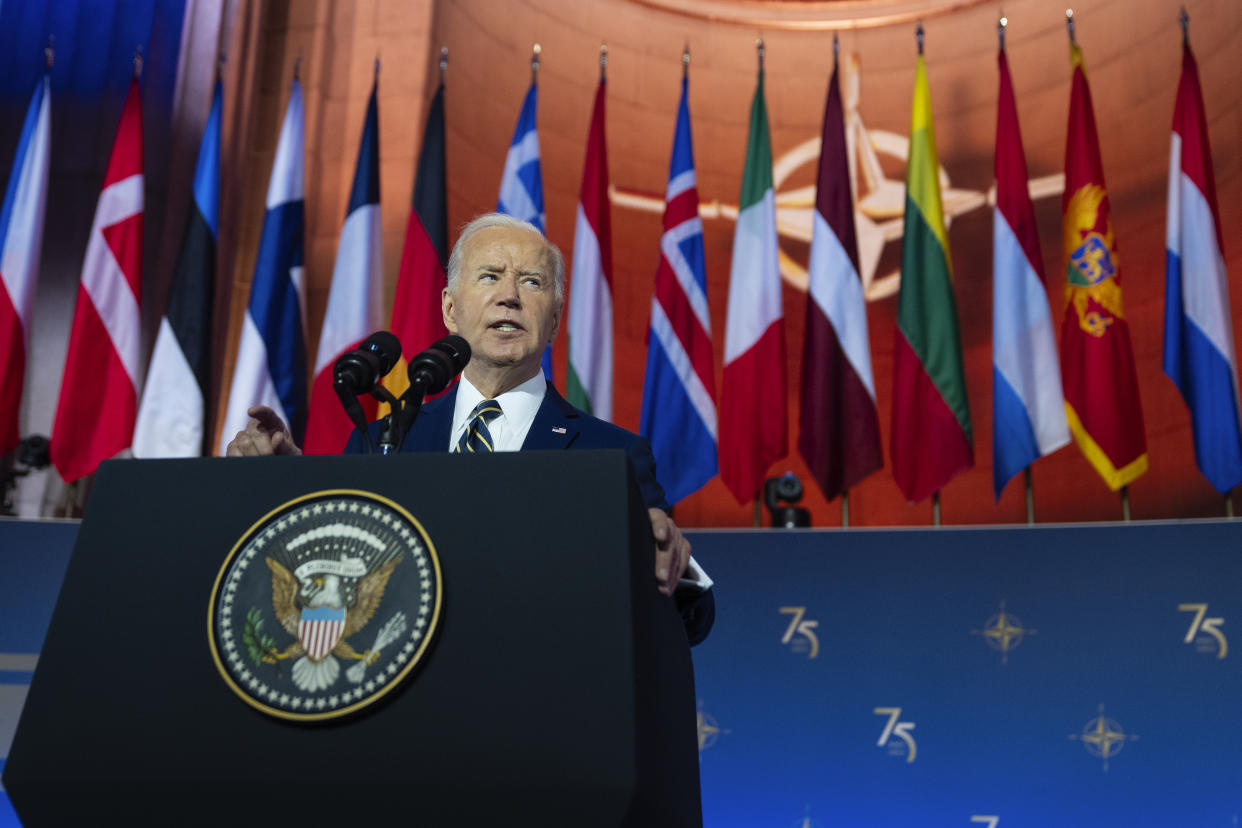Biden aimed to prove US and global doubters wrong with NATO speech

- Oops!Something went wrong.Please try again later.
- Oops!Something went wrong.Please try again later.
With the eyes of the world on him, President Joe Biden delivered a forceful speech to open the NATO summit in Washington, aiming to reverse doubts about his fitness for the job domestically while boasting that his leadership revitalized the storied alliance and saved Ukraine.
The address, which kicked off three days of high-profile meetings in the steamy U.S. capital, served as both a political and geopolitical test for Biden. With every speech, he must prove that age is just a number and that his shambolic debate performance against former President Donald Trump was a one-off bad night. And with every appearance at the NATO Summit this week, Biden must demonstrate he can still rally allies to Ukraine’s cause for the long haul.
“Ukraine can and will stop Putin,” he said at the ornate Mellon Auditorium in Washington. “Russia will not prevail. Ukraine will prevail.”
The president didn’t fumble over words as he often does during remarks. He was clear and forceful, appearing energized by the transatlanticism that he has embraced throughout his political career.
The speech was more than atmospherics. Biden used the occasion to announce the delivery of new air defenses for Ukraine, one of Kyiv’s top requests for this summit. The U.S. and four NATO allies — the Netherlands, Germany, Italy, Romania — will this year send four Patriot air-defense systems and related components as well as one SAMP/T system. In the coming months, Washington and its partners will also deliver dozens more tactical air-defense systems to bolster Ukraine’s security and expect to make similar announcements later in the year.
A critical part of the new assistance package will see some countries who have ordered air defense missiles from U.S. companies bumped down the list, as supplying those interceptors to Ukraine will take priority.
“Make no mistake: Russia is failing in this war,” Biden declared before noting that 350,000 Russian soldiers have been killed or wounded, with another 1 million people fleeing the country. “When this senseless war began, Ukraine was a free country. Today, it’s still a free country, and the war will end with Ukraine remaining a free and independent country.”
In a joint statement released shortly after Biden’s remarks, the president and the leaders of the Netherlands, Germany, Italy, Romania and Ukraine said: “Our message to Moscow and the world is clear: Our support for Ukraine is strong and unwavering.”
The move ends months of a U.S.-led search for air-defense systems to send to Ukraine and negotiations over how to procure them. Some nations didn’t want to part with the sophisticated defensive weapons, at least not before figuring out how to replace them. Last week, a senior Biden administration official told POLITICO “we're shaking the hell out of the trees, and we’re going to get the highest number that we can.”
A boost in air-defenses was high on Ukraine’s list, as Russia’s superior arsenal allowed it to bombard cities and key military targets. On Monday, Russia overwhelmed Ukraine’s defenses in Kyiv, launching a deadly strike on a children’s hospital — one of Europe’s largest — leading surviving patients to receive cancer treatments on the street.
Andriy Yermak, head of Ukrainian President Volodymyr Zelenskyy’s office, told POLITICO reporters before the announcement that he was pleased his country would get more support, but he lamented that the delivery was unnecessarily “delayed” and should’ve been completed much sooner. “Now it’s necessary to close our cities,” he said, claiming these and future air-defense system transfers will better protect against Russian missiles and deter future barrages.
Biden will continue to be under a microscope this week as he manages a busy schedule, including a jam-packed Wednesday and a rare news conference on Thursday, when he will face questions about his age and mental acuity.
Biden will use the days ahead to reassure NATO allies — and skittish Democrats at home — that he’s up to the job of taking down Trump, as heads of state from Europe and North America prepare for the possibility of his predecessor’s return. The president has said the summit is a good venue for judging his abilities and has pointed to his leadership in rallying NATO support for Ukraine as evidence that he’s equipped to serve four more years.
With the potential of Trump’s return to power looming, the president has repeatedly highlighted his commitment to NATO, while warning voters that his predecessor would abandon the alliance if he returns to the White House.
Unlike in 2016, NATO allies are actively preparing to manage the return of a NATO-skeptic Trump administration. NATO officials are ramping up weapons production, consulting with Trump’s advisers and holding meetings to prepare for the former president’s return, and with that, an America-first, restraint-focused approach and a deep skepticism toward Europe.
Paul McLeary contributed to this report.

